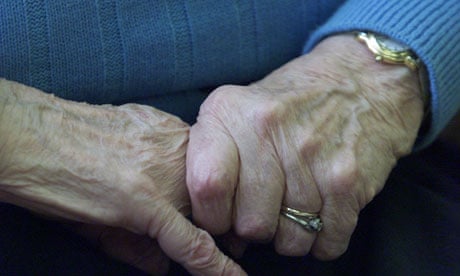Drugs for Alzheimer's disease, which were the subject of a massive row when they were restricted only to NHS patients with moderate symptoms, carry on working even on people in the severe stage of the illness, a study has shown.
The controversy over donepezil (Aricept) and other similar drugs ended up in the high court in 2007. Drug manufacturers Eisai took Nice, the National Institute for Health and Clinical Excellence, to judicial review, with the support of the Alzheimer's Society, which was outraged that people in the early stage of the disease were not eligible.
The court found against Nice on only one out of six allegations, but later Nice reviewed the guidance and amended it so that people in the early stages, with mild symptoms, could also have treatment.
Evidence on what the drugs could do for people in the later stages of disease, however, has been lacking. They were not included in the trials run by the pharmaceutical companies. The Medical Research Council and the Alzheimer's Society stepped into the breach.
The study they funded, led by Professor Robert Howard from the Institute of Psychiatry at Kings College London, and published in the New England Journal of Medicine, has concluded that the drugs carry on working in people whose illness has become severe.
"For the first time, we have robust and compelling evidence that treatment with these drugs can continue to help patients at the later, more severe stages of the disease," he said. "We observed that patients who continued taking donepezil were better able to remember, understand, communicate and perform daily tasks for at least a year longer than those who stopped taking the drugs. These improvements were noticeable to patients, their caregivers and doctors."
The drugs are not a cure. All the 295 patients in the trial continued to get worse, but the downhill progress was slowest in those who were given both donepezil and a second similar drug, mementine. Those who were given only placebos did worse.
Researchers measured not only patients' scores on tests of their thinking and memory, but also their ability to dress themselves and do normal everyday things, which generally have far more impact on their lives and those of their carers.
A slowdown in decline was seen even in people who were on the dummy pills.
"The difficulty with the dementia drugs is that they have a massive placebo effect," said Professor Nick Fox, senior MRC clinical fellow at the Institute of Neurology, University College London. "But we know we are seeing much more than an emotional attachment to the drugs – we are seeing real benefit."
What is really needed, however, are new drugs which can check or cure the disease, rather than relieving symptoms, said Fox. Those are not in sight. "We desperately need more funding to crack this problem, which will affect probably a third of all of us," he said.
"We need a commitment from government, working in partnership with charities, using the fantastic resources of the NHS to really improve resources to find treatments for these devastating diseases."
Around 750,000 people in the UK and 18 million worldwide suffer from Alzheimer's disease. The study shows the drugs could benefit twice as many people as they do at the moment. Donepezil will shortly go out of patent. Generic versions will cut the £2.50 a day price tag to something like 80p, making it more affordable for the NHS.
In a statement, Nice said that although its guidance stated the drugs should be given for those with mild to moderate disease, it also said they should be continued as long as they were having a worthwhile effect.

Comments (…)
Sign in or create your Guardian account to join the discussion